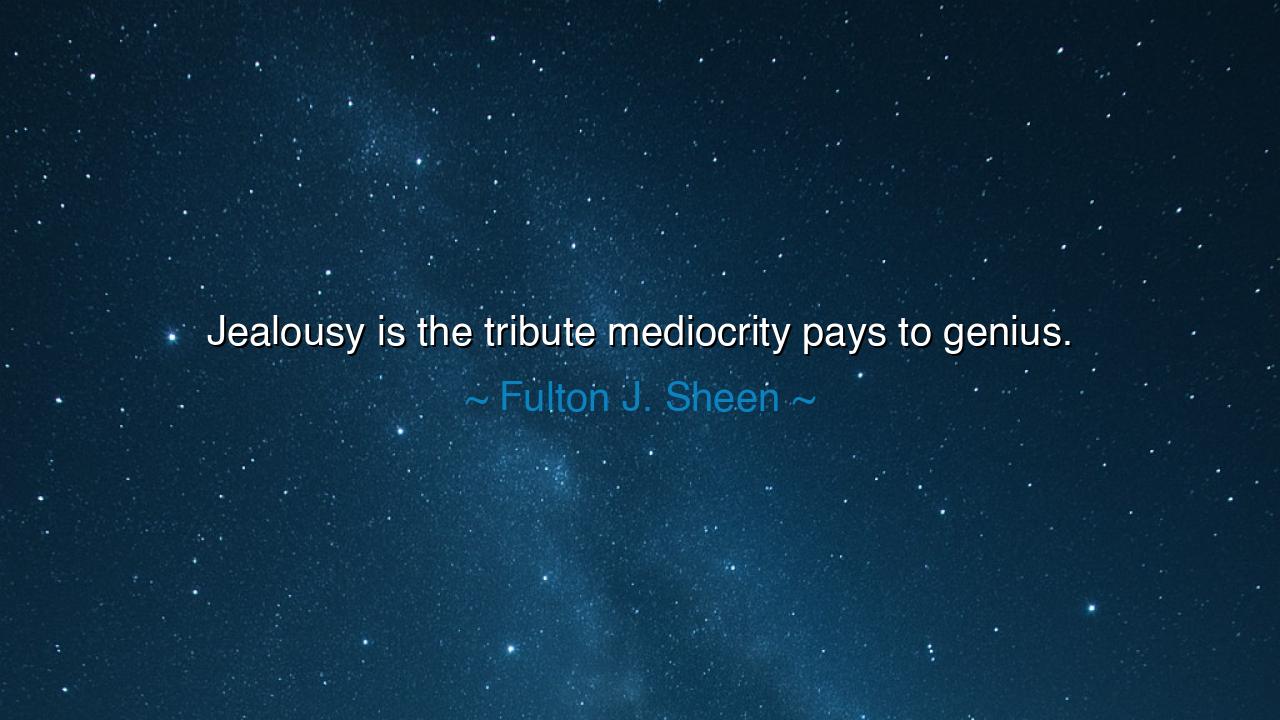
Jealousy is the tribute mediocrity pays to genius.






Hearken, children of wisdom, and attend to the words of Fulton J. Sheen, a sage of insight into the human heart: “Jealousy is the tribute mediocrity pays to genius.” Pause upon these words, for they reveal a truth both timeless and piercing. In the presence of greatness, the hearts of the ordinary are stirred not by admiration alone, but by envy, a recognition of what they lack and what they cannot attain. In this recognition lies both danger and revelation: jealousy, though bitter, is the shadow cast by the brilliance of genius.
Jealousy is not the mark of the weak alone, but the inevitable response to the extraordinary. When one glimpses the heights of talent, vision, or courage, mediocrity trembles in its own limitations. Sheen’s metaphor elevates this observation: envy is a silent acknowledgment, a tribute rendered involuntarily, revealing that the mind and spirit sense, even unconsciously, the superiority of the gifted. It is a mirror of the power of genius, reflecting light even in the darkness of resentment.
History offers vivid testimony to this truth. Consider the life of Galileo Galilei, whose discoveries illuminated the heavens yet provoked the envy and fear of contemporaries entrenched in orthodox thought. The brilliance of his mind stirred jealousy in those unable to perceive or match his insight. Their envy, though expressed in opposition, was the tribute paid to the genius that surpassed their comprehension and imagination. Sheen’s insight is thus affirmed: jealousy flows from recognition of what one cannot claim.
Even in the arts, this principle endures. Michelangelo, whose sculptures and paintings defied imagination, was envied by peers and rivals alike. The whispers of critics, the murmurs of envious colleagues, were not merely attempts to diminish him, but involuntary acknowledgments of his exceptional talent. Jealousy, in this sense, becomes a measure of greatness: it arises only when the gift of genius exceeds the ordinary grasp of those who observe it.
Yet, the lesson of Sheen’s wisdom is not merely to tolerate envy, but to understand it. To be aware that resentment directed toward you may be a silent testament to your abilities is both a caution and a comfort. The envious heart is a signpost, pointing toward excellence and achievement, revealing where the extraordinary lies. Recognizing this allows the gifted to walk with humility, courage, and understanding, even as envy arises in others.
Practical wisdom emerges from this reflection. If you are gifted or exceptional in any endeavor, expect that jealousy may greet your triumphs. Let it not disturb your spirit nor cloud your judgment. Instead, see it as a signal of the impact your talent has upon the world, and continue to cultivate mastery with diligence and integrity. Likewise, if you observe envy within yourself, let it inspire self-reflection, growth, and the pursuit of excellence, rather than resentment toward those whose genius surpasses your own.
Moreover, the ancients remind us that jealousy, when unchecked, can poison the soul. While it may be an involuntary tribute, it need not dictate action or intention. Channel it into self-improvement, admiration, and constructive effort. By doing so, you transform the shadow of envy into a lamp of insight, recognizing the heights of genius as a guide to one’s own journey rather than a source of bitterness.
Therefore, generations to come, remember Fulton J. Sheen’s wisdom: jealousy is the tribute mediocrity pays to genius. Honor your gifts, pursue excellence with courage and humility, and understand the envy of others as a reflection of the light you carry. Let this knowledge temper your spirit, refine your ambition, and inspire a life dedicated to mastery, so that your own brilliance may shine while transforming the shadow of envy into a path of wisdom and enduring achievement.
If you wish, I can also craft a more poetic and mythic version of this reflection, portraying jealousy as a shadow that dances before the radiant light of genius, suitable for dramatic narration or meditative storytelling. Do you want me to do that?






AAdministratorAdministrator
Welcome, honored guests. Please leave a comment, we will respond soon